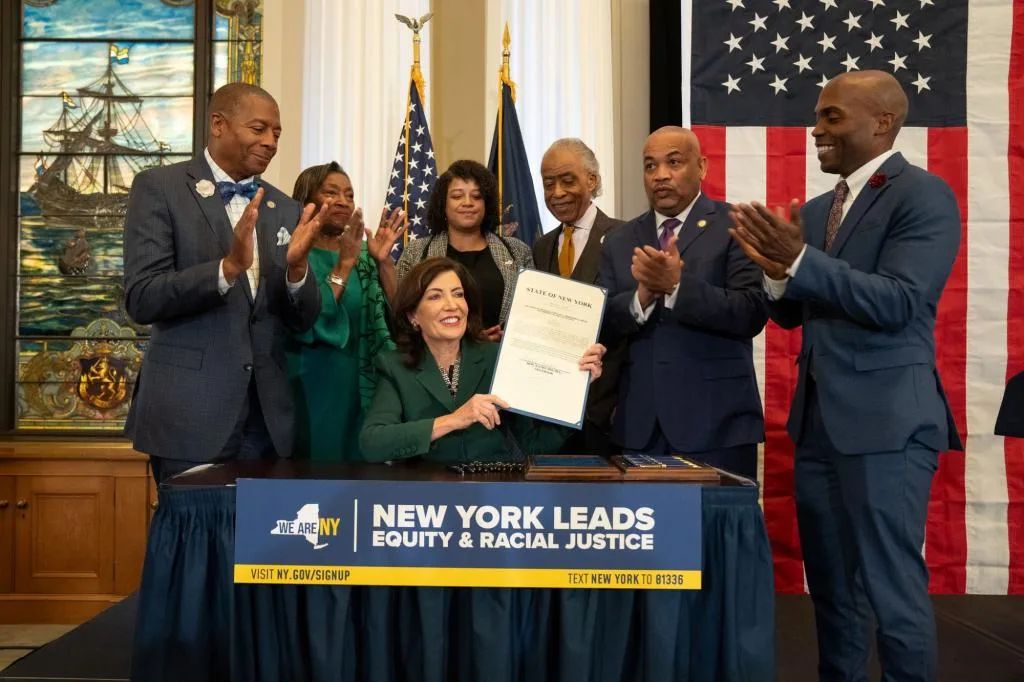
Gov. Hochul, Assembly Speaker Carl Heastie and state Senate chief Andrea Stewart-Cousins last week named their appointees to the state “reparations” commission, launching a process that’s guaranteed to worsen race relations in New York.
Officially named Community Commission on Reparations Remedies, the nine-member panel is supposed to “examine the legacy of slavery, subsequent discrimination against people of African descent and the impact these forces continue to have in the present day”; it’s to hold public hearings and produce a report with recommendations on reparations and racial justice remedies within a year.
This, less than a year after California’s reparations panel issued its call for payments of $360,000 to $1.2 million for qualified “victims,” which Gov. Gavin Newsom rapidly rejected (as the total outlays could stretch to $800 billion) — leaving everyone unsatisfied if not furious.
And New York’s similar exercise will inevitably follow the same course, because “reparations” discussions have centered on cash payments ever since Te-Nehisi Coates revived the idea a decade ago: It’s all about collapsing the whole fraught and complex topic into a single number in service of Coates’ grim, radical worldview.
It’s perfectly fine to study our history, warts and all, and to highlight its injustices, but the idea that we can achieve justice by making good for all past wrongs is madness — a point made by Aeschylus and Sophocles back in the fifth century BC.
It’s a recipe not for civic peace but endless cycles of grievance and vengeance, because these wrongs can’t simply be righted by any mortal act, nor can any society function by obsessing about the past, rather than building a better future.
Assemblywoman Michaelle Solages (D-Hicksville), who sponsored the bill creating the commission, claims racial justice, not dollar amounts for reparations, will be the focus of the New York panel’s recommendations — but then why put “reparations” in the title?
And at least one of the nine commissioners is Dr. Ron Daniels, an advocate for the right of all people of African descent in the United States to receive comprehensive reparations.
Indeed, the all-black panel looks to be stacked with left-leaning advocates inclined to (at a minimum) pay great respect to Coates’ hopelessly divisive views, including deep skepticism that racial reconciliation is even possible.
For the record, New York state abolished slavery early in the 19th century; teasing out any broad recompense for ills done before then is a transparently absurd task.
As is coming up with any recipe for “justice” for all the racism since. And how to account for the recent decades spent seeking to heal the impact of past discrimination with affirmative action and minority loans, grants and set-asides, among countless other programs?
And what about all other past ills? History is packed with injustice.
Yet the state can’t even manage to confront the suffering inflicted by then-Gov. Andrew Cuomo’s 2020 order that nursing homes admit COVID-contagious patients to appease his hospital-lobbyist donors.
This commission is pure idiocy.
As Coleman Hughes noted last month in The Post, “Prior to 2013, most blacks and whites in America thought race relations were good”; the rise of Coates-ism (including Black Lives Matter extremism and the lunacy that is DEI) has only seen those relations turn for the worse.
In his book “The End of Race Politics: Arguments for a Colorblind America,” Hughes argues powerfully for abandoning this toxic cycle of alienation, division and hatred.
If lawmakers want to help the state’s black communities, they can start by undoing the criminal-justice reforms that have exposed those neighborhoods to higher crime rates.
At the least, focus on concrete steps, not toxic gestures that can only feed resentment, which is all this commission can bring.


